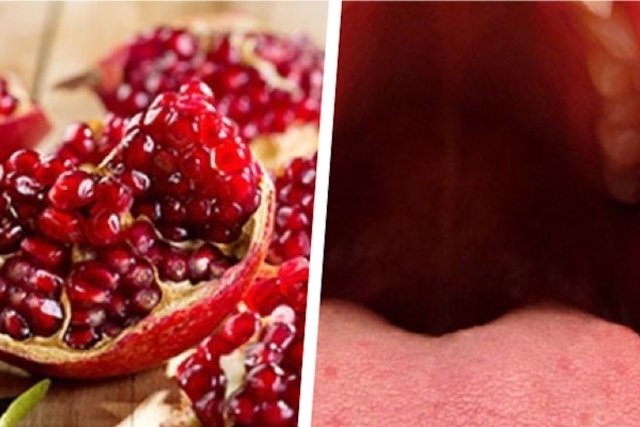Pomegranate tea is a drink rich in polyphenols, flavonoids, alkaloids and triterpenes, which are substances with antioxidant, anti-inflammatory and diuretic action capable of combating sore throat, gingivitis or helping to treat diabetes or high blood pressure.
Furthermore, due to its antioxidant properties, pomegranate tea can help fight cancer, improve the action of the immune system and help with weight loss. See how to consume pomegranate to lose weight.
Pomegranate tea must be prepared with the peel of this fruit, and although it cannot replace the use of medicines recommended by a doctor, it can be used to complement medical treatment due to its health benefits.
What is it for
Pomegranate tea is used for:
- Relieve sore throat;
- Reduce high blood pressure;
- Decrease triglycerides;
- Improve good cholesterol;
- Combat diarrhea or dysentery;
- Prevent gingivitis, periodontitis or stomatitis;
- Combat arthritis or gout;
- Aid in weight loss;
- Strengthen the immune system;
- Maintain skin health;
- Prevent or Alzheimer’s.
Pomegranate tea, due to its antioxidant and anti-inflammatory action, can also help reduce damage caused by free radicals in cells and prevent cardiovascular diseases, such as atherosclerosis or heart attack.
Furthermore, some studies carried out (1,2,3) in a laboratory with cells, they showed that pomegranate can help prevent or help fight breast, prostate, intestinal or head and neck cancer, as it is rich in antioxidants, which reduce the growth or cause the death of cancer cells. However, studies are still needed in people to prove these benefits.
Although it has many benefits, pomegranate tea does not replace medical treatment and should be used under the guidance of a doctor or herbalist.
How to make pomegranate tea
The part normally used to make pomegranate tea is the peel, from which active substances with medicinal properties are extracted.
Ingredients
- 10 grams of pomegranate peel;
- 1 cup of water.
Preparation mode
Add the pomegranate peels to a pan with water. When it starts to boil, leave it for another 5 minutes and turn it off. After this time, cover the pan and let the tea rest for another 5 minutes. Wait for it to cool down and then drink it 2 to 3 times a day.
In addition to tea, pomegranate can also be consumed in its natural form or in the preparation of juices. See other ways to use pomegranate.
Possible side effects
The most common side effects that may occur with consuming pomegranate tea are nausea, vomiting or stomach irritation.
Furthermore, when pomegranate peel tea is consumed in larger quantities than recommended, it can cause poisoning and put life at risk. Therefore, its use must be carried out under the guidance of a doctor or a herbalist.
Pomegranate tea can also cause serious allergic reactions that require immediate medical attention. Therefore, you should stop treatment and seek the nearest emergency room if you experience symptoms such as difficulty breathing or wheezing, a feeling of a closed throat, swelling in the mouth, tongue or face, or intense itching. Know how to identify the symptoms of a serious allergic reaction.
When it is not indicated
Pomegranate tea should not be used by children under 2 years of age, pregnant or breastfeeding women, or people who have gastritis or stomach ulcers, as it may cause stomach irritation.
Furthermore, pomegranate tea should not be used by people who are allergic to this fruit.
Bibliography
- PANTH, N.; et al. Anticancer Activity of Punica granatum (Pomegranate): A Review. Phytother Res. 31. 4; 568-578, 2017
- ZARFESHANY, A.; et al. Potent health effects of pomegranate. Adv Biomed Res. 3. 100, 2014
- SHIRODE, AB; et al. Antiproliferative effects of pomegranate extract in MCF-7 breast cancer cells are associated with reduced DNA repair gene expression and induction of double strand breaks. Mol Carcinog. 53. 6; 458-70, 2014
- SEPEHR, KS; et al. Studies on the Cytotoxic Activities of Punica granatum L. var. spinosa (Apple Punice) Extract on Prostate Cell Line by Induction of Apoptosis. ISRN Pharm. 2012. 547942, 2012
- EGHBALI, S.; et al. Therapeutic Effects of Punica granatum (Pomegranate): An Updated Review of Clinical Trials. J Nutr Metab. 2021. 5297162, 2021

Sign up for our newsletter and stay up to date with exclusive news
that can transform your routine!
Warning: Undefined array key "title" in /home/storelat/public_html/wp-content/plugins/link-whisper-premium/templates/frontend/related-posts.php on line 12
Warning: Undefined array key "title_tag" in /home/storelat/public_html/wp-content/plugins/link-whisper-premium/templates/frontend/related-posts.php on line 13




